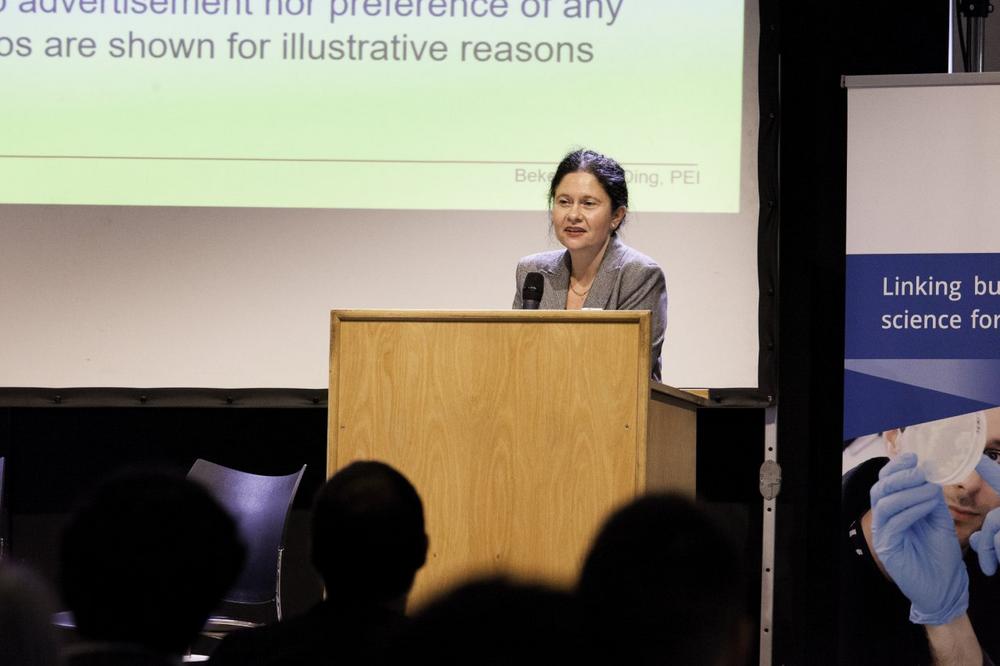The Robotics-4-Labautomation Symposium offered a wide-ranging programme highlighting current topics related to robotics and laboratory automation in the pharmaceutical and healthcare industries. A wide variety of lectures addressed the topics of sterility in the laboratory as well as challenges and requirements when integrating a robot into a laboratory automation system. Other topics included object identification, robot sensors and AI interaction, and the digital twin.
The participants took the opportunity to network and exchange ideas with scientists and industry representatives from all over Europe.
Focus: Qualification and validation in sterile environment
In addition, aspects of quality management and validation of robotic systems were addressed from different angles during the event. First up was keynote speaker Prof. Isabelle Bekeredjian-Ding, acting director of ZEPAI (Center for Pandemic Vaccines and Therapeutics) and Department Head of Microbiology at the Paul Ehrlich Institute, who gave a presentation on regulatory considerations on automation from a pharmaceutical microbiology perspective. "It is important that stakeholders along the entire value chain of the healthcare industry exchange ideas to develop new robotic solutions in the laboratory. The Robotics-4-Labautomation Symposium made a nice contribution in this regard," said Prof. Isabelle Bekeredjian-Ding, assessing the event.
Following the lecture by Prof. Isabelle Bekeredjian-Ding, a panel discussion took place in which users, developers, researchers and regulatory experts came together to discuss the integration possibilities of robots in the pharmaceutical industry and diagnostics from different perspectives.
Outlook: Trends of the future
The Symposium concluded with an outlook on the current top trends in laboratory automation and robotics. Young researchers spoke, for example, about advances in transparent object detection and pose estimation. Furthermore, it was presented how robots can be more widely accepted in Europe in the future.
"The first Robotics-4-Labautomation Symposium was a great success for the TraceBot project, because here we managed to bring together project partners with robotics experts from different disciplines and countries. This allows us to generate important added value for our funding project," concludes Dr Anthony Remazeilles from the Fundación Tecnalia Research & Innovation, who is the scientific and technical manager of the TraceBot project.
You can find the article in german HERE
Today manual procedures still dominate when it comes to creating and testing new healthcare products. This is because regulations require certainty in the execution of each process step and systematic checking to verify task completion, known as traceability. A particular challenge in this field is the handling of sterile medical products. Lab automation with dexterous and reasoning robots is the solution.
The EU funded TraceBot project aims at addressing healthcare-related processes, and more exactly the membrane-based sterility testing process. The objective of TraceBot is to bring verifiable actions to robot manipulation by reasoning over sensor-actor trails in a traceability framework based on digital-twin technology and extend current robot motion planners with the automatic execution of self-checking procedures that create a semantic trace of the actions performed. The goal is to create robotic systems able to understand what they perceive and do, to ensure that any manipulation action is verified, thus meeting the needs of the regulated environment.
The TraceBot project brings together six strong partners from five countries: Astech Projects Limited (England), Commissariat à l‘Energie Atomique et aux Energies Alternatives (France), Fundación Tecnalia Research & Innovation (Spain), Invite GmbH (Germany), Technische Universität Wien (Austria) and Universität Bremen (Germany) and is being guided by representatives of the pharmaceutical industry. Each partner contributes its own expertise by providing a solution working hand-in-hand with each other partner’s solution. This cooperation will permit the development of tactile grippers for handling medical products, the design of a set of manipulation skills to execute the regulatory checking actions for every assembly step, the generation of an intuitive programming method for a quick adaptation to novel products and tasks and, last but not least, the development of a reasoning framework to monitor and control the safe and failure-resistant operation of the robot system, in order to meet the need of safety-critical automation. The TraceBot project’s coordination, communication and dissemination is carried out by the health network BioLAGO (Germany).
Duration: January 2021 till March 2025.
TraceBot
Byk-Gulden-Str. 2
78467 Konstanz
Telefon: +49 (7531) 9215250
https://www.tracebot.eu
project manager
Telefon: +49 (7531) 71409 18
E-Mail: maike.neumann@biolago.org
![]()

